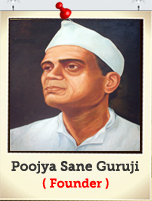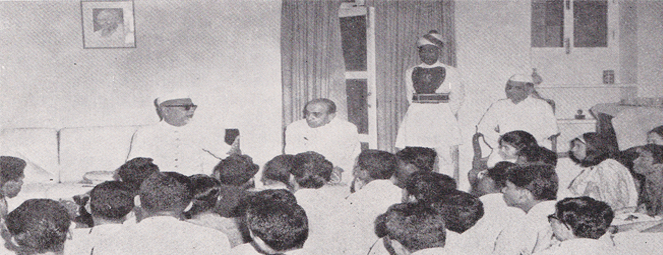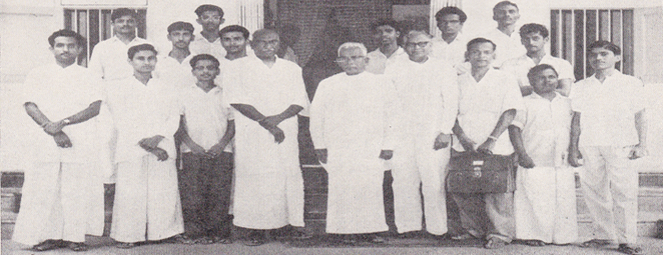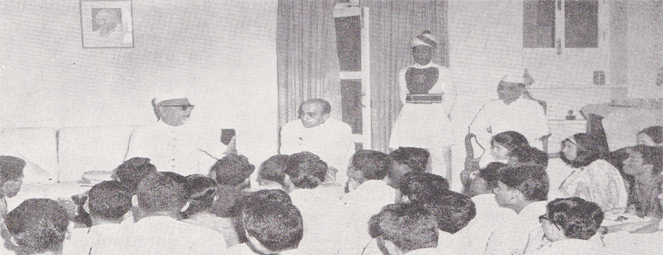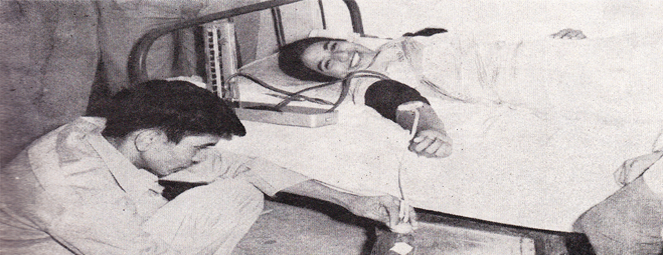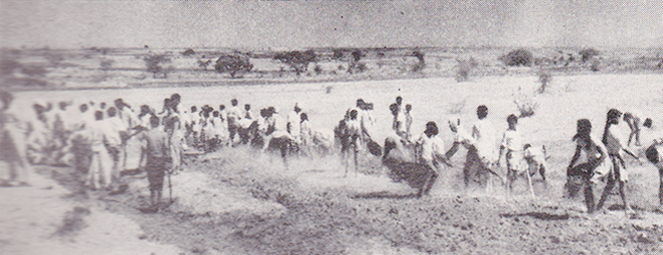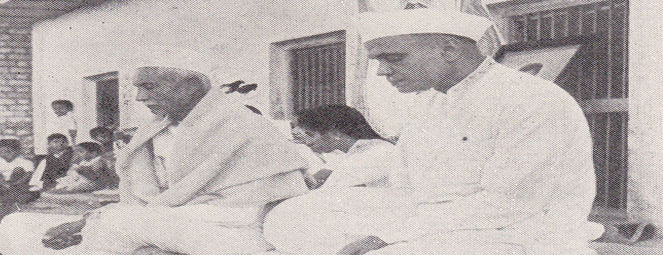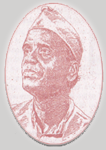Antar Bharati Vasantik Vidyalaya
India is a multilingual country and it is always advantageous to know more than one language. On the international level we see a new phenomenon: the phenomenon of large scale language study. We in India are not still aware of the place of language in creating understanding and goodwill among different people. We must be able to establish direct contact between various language groups. We expect English and Hindi to serve for give and take between various literatures but that is not a very efficient way of' doing things. Every translation is always a sort of' an interpre-tation and indirect translations are likely to lose the charm and vigour of the original. Direct translations from one Indian language into another should be possible. For ,this, study of languages should be encouraged on a large scale. Every young citizen must try his hand at different languages. Acharya Narendra Deo and many others have said that study of one language from the South is as essential for the Hindi speaking people as Hindi to non-Hindi speaking people. Communication should always be at least a two way process.
Study of language generally starts with script and grammar and many shy away from its rigour at that level. Instead Antar Bharati would like to recommend a different path which Acharya Bh.agwat, the then Director of' the activities or Antar Bharati, followed. Instead of starting from the script and grammar, he selected best literary pieces from different languages and introduced people to the select literature of that language which helped creating love for the language. Then he, got those pieces printed in Deonagari script and more enthu-siastic people then turned to script and grammar.
Students have long summer holidays. They can utilise this time for the study of languages. Antar Bharati did some pilot work in this field. In 1965 anti-Hindi agitation in Tamil Nadu disturbed many a people. Antar Bharati gave a call to young people in Maharashtra to attend a camp which was to introduce to them the land, literature, language and people of Tamil Nadu. Next year they were expected to go to Tamil Nadu and try to understand the pro¬blem at first hand. Twenty-five enthusiastic young people were admitted to the summer school. Primary lessons in language were imparted along with lectures on allied subjects. Film, music and other aspects of Tamil cultural life were also introduced. A few Tamil Students were also invited to stay in the camp, who helped as ready guides to the students. In summer of 1966 they went to Tamil Nadu. Dakshin Bharat Hindi Prachar Sabha of Madras conducted a refresher course for them. Then they stayed in different Tamilian families and moved to various places in Tamil Nadu. They would talk in Tamil with the children and ladies and could shake away all the barriers of formality. They got glimpse of the real Tamil Nadu and a sense of understanding evolved. The images that are created through Newspapers are many a times distorted and partial. On negative side the young people realised that there is hardly any enemity against the North. Artificial barriers are put between men and men and creating opportunities for direct meeting of the people will help create under-standing and goodwill. Many evils crop up because of the lack of direct contact.
In one of the meeting where Smt Tara Cherian, wife of the then Governor of Maharashtra, was to be the chief guest, young people started the function with the inspiring Tamil song of Shri Subrahmanya Bharati "Valiye Chenamil Val natramil" and she was overwhelmed by the idea that Marathi boys and girls were singing a Tamil song in the same tunes and pronouncing the same words in correct phonetics!
Deccan College Marathi Department has evolved a method of teaching Marathi to American peace corps volunteers in about six weeks time. This not only gives them working knowledge of Marathi but gives them a background of Marathi life. Suchprogrammes, if developed in a summer school would help integration to a large scale.
Literary Institutions, Language Organi-sations like Rashtra Bhasha'Prachar Sabha, if contacted may come forward to run language classes. If the students are kept in families of that language group, it may help them pick up many things without much effort, because the atmosphere in the family will accelerate their formal study. School project, Yuvak Sneh Meelan pro¬grammes could be linked up to this summer school programme.
Students have long summer holidays. They can utilise this time for the study of languages. Antar Bharati did some pilot work in this field. In 1965 anti-Hindi agitation in Tamil Nadu disturbed many a people. Antar Bharati gave a call to young people in Maharashtra to attend a camp which was to introduce to them the land, literature, language and people of Tamil Nadu. Next year they were expected to go to Tamil Nadu and try to understand the pro¬blem at first hand. Twenty-five enthusiastic young people were admitted to the summer school. Primary lessons in language were imparted along with lectures on allied subjects. Film, music and other aspects of Tamil cultural life were also introduced. A few Tamil Students were also invited to stay in the camp, who helped as ready guides to the students. In summer of 1966 they went to Tamil Nadu. Dakshin Bharat Hindi Prachar Sabha of Madras conducted a refresher course for them. Then they stayed in different Tamilian families and moved to various places in Tamil Nadu. They would talk in Tamil with the children and ladies and could shake away all the barriers of formality. They got glimpse of the real Tamil Nadu and a sense of understanding evolved. The images that are created through Newspapers are many a times distorted and partial. On negative side the young people realised that there is hardly any enemity against the North. Artificial barriers are put between men and men and creating opportunities for direct meeting of the people will help create under-standing and goodwill. Many evils crop up because of the lack of direct contact.
In one of the meeting where Smt Tara Cherian, wife of the then Governor of Maharashtra, was to be the chief guest, young people started the function with the inspiring Tamil song of Shri Subrahmanya Bharati "Valiye Chenamil Val natramil" and she was overwhelmed by the idea that Marathi boys and girls were singing a Tamil song in the same tunes and pronouncing the same words in correct phonetics!
Deccan College Marathi Department has evolved a method of teaching Marathi to American peace corps volunteers in about six weeks time. This not only gives them working knowledge of Marathi but gives them a background of Marathi life. Suchprogrammes, if developed in a summer school would help integration to a large scale.
Literary Institutions, Language Organi-sations like Rashtra Bhasha'Prachar Sabha, if contacted may come forward to run language classes. If the students are kept in families of that language group, it may help them pick up many things without much effort, because the atmosphere in the family will accelerate their formal study. School project, Yuvak Sneh Meelan pro¬grammes could be linked up to this summer school programme.
About Shri Pandurang Sadashiv Sane
About Antar Bharati Trust
ANTAR BHARTI was the dream of that great patriot, scholar and writer of Maharastra, the late Shri Padurang Sadashiv Sane, known throughtout Maharastra as Sane Guruji. In a number of articles from 15th August 1948 onwards he explained to his countrymen the dream of Antar Bharti...
Antar Bharati (Monthly)

